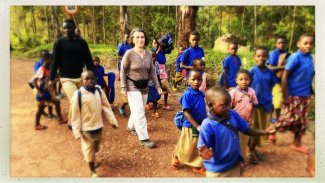How does the KiTZ Theaterkumpanei end up in Rwanda?
Rwanda is one of the three focus countries that we explore as part of our three-year research funding, alongside Portugal and Iran. Given the long and close, friendly relations with the state of Rhineland-Palatinate, it was obvious to choose Rwanda as an African country. Existing networks facilitate access and understanding of the country. You have to know people who know people!
Who are the partners in Rwanda – whom have you met?
In addition to the coordination office of the state of Rhineland-Palatinate, connections to the Club Soroptimist International were crucial in opening important contacts for us. In terms of artists, it was once again coincidence that helped us. Two theater makers with whom we collaborated many years ago at the international theater festival "Schwindelfrei" were working on a German-Rwandan co-production. Sophia and Lisa introduced us to Wesley Ruzibiza, allowing us to meet and befriend key representatives of the creative scene in Rwanda directly. In the field of children's theater, it is the ISHYO Arts Center led by Carole Umulinga Karamera, Wesley Ruzibiza from L'Espace, the most important creative center in Rwanda, the Ecole San Marco in Kigali as a research location, Sonia Uwimbabazi as a local cooperation partner driving our project forward on-site. Additionally, the Goethe-Institut and the coordination office of the state of Rhineland-Palatinate.
What specific projects are currently underway?
We have already organized a successful reading, part of our efforts to initiate the establishment and strengthening of an independent and robust children's literature scene in Rwanda. A practical project accompanied by a two-part evaluation at the Ecole San Marco will serve as a starting point for a two-day workshop at the Goethe-Institut for storytellers, authors, illustrators, and publishers. The long-term goal is to preserve Rwanda's rich oral storytelling heritage, which, being exclusively transmitted orally, is at risk of being lost due to the speed of societal change. All culture and stories in Rwanda are orally transmitted; books are not in use. For an emerging education nation without significant natural resources, the associated low literacy is a problem.
Will the Ludwigshafen audience benefit from this?
The insights gained from encounters and travels alone expand our own understanding of cultures, people, and the audience we have in Ludwigshafen. Only by empowering colleagues in Rwanda to preserve and retell their own stories will we hear and see the diverse perspectives we seek for our "no-longer-white" audience. We have already found some individual stories for new plays - hopefully, more will follow for us and the world.
How do you finance these initiatives?
The research is funded by the state of Rhineland-Palatinate. For the children's literature promotion project, we need to raise approximately €18,000 additionally.
Is there a final important thought?
We have a very ambitious goal for Rwanda, for our friends in Africa. It is a path we want to explore with small steps so that artists in Rwanda can eventually "give every child a book." That would be 300,000 books a year - a tremendous boost and incentive for great stories! A confident voice that can also be heard here in the "old West." It is time!








